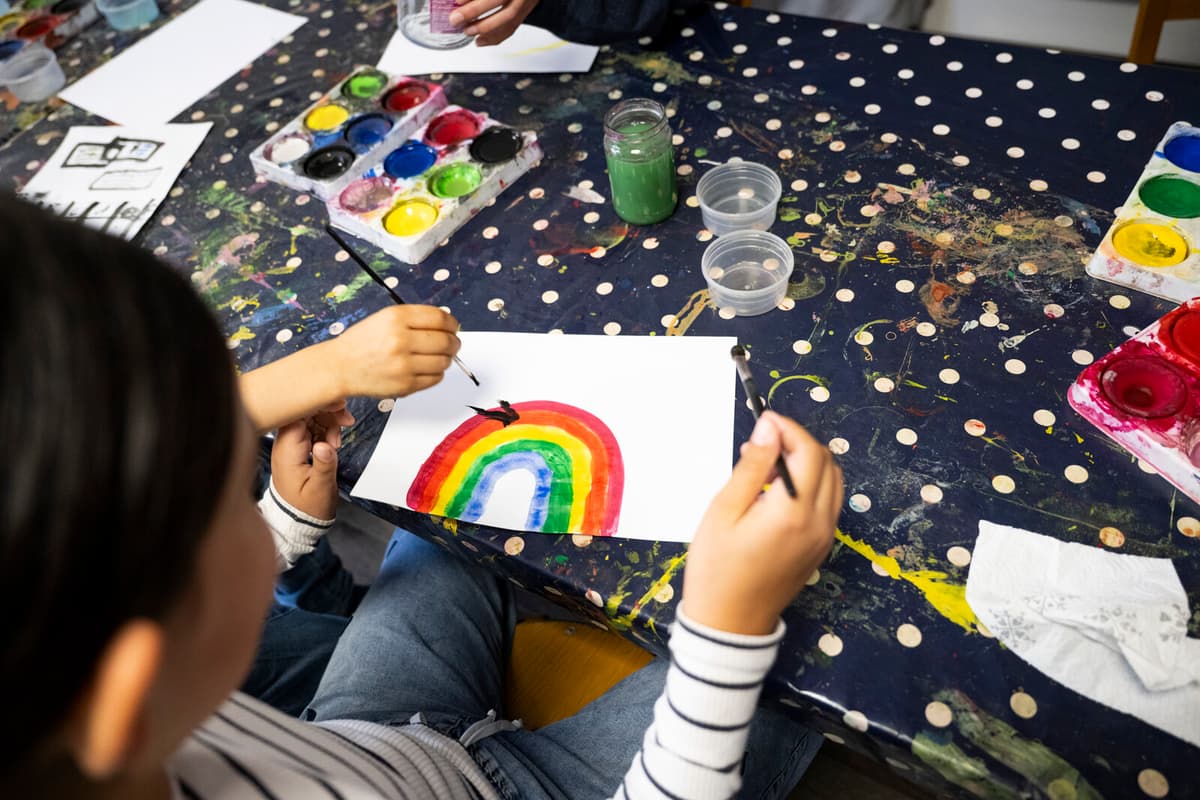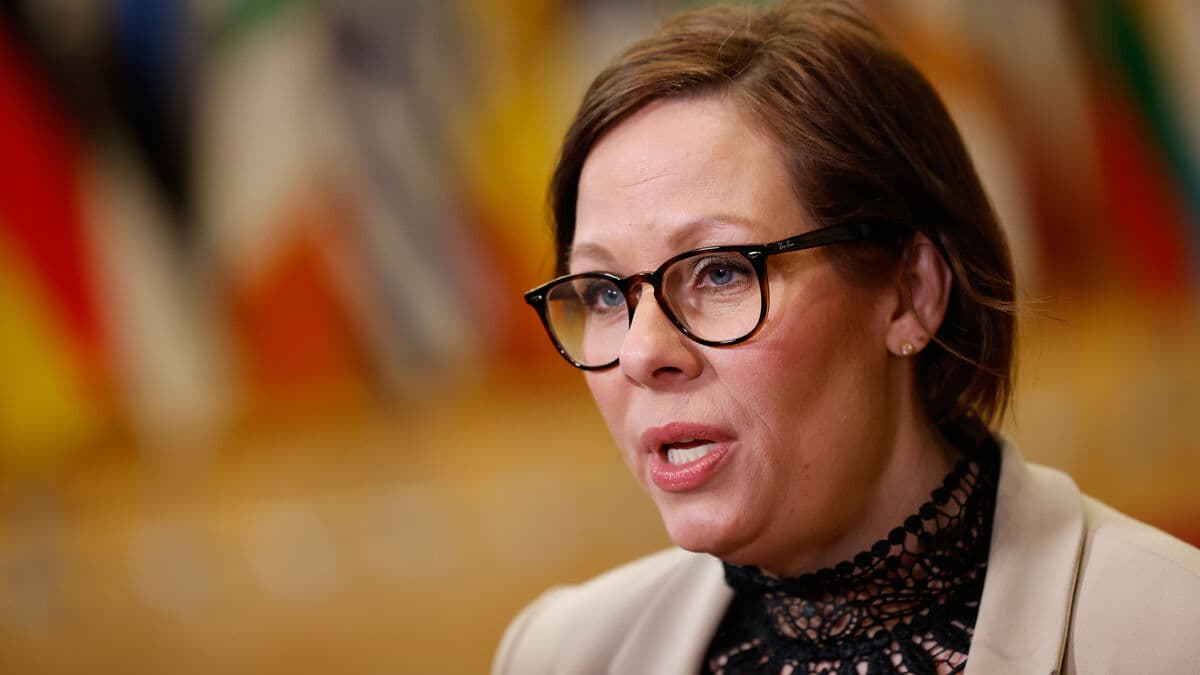In the premises of the City Mission in the Stockholm suburb of Vårberg, there is a feverish activity. The time is just after 3:00 pm and soon vegetarian patties will be served to the many families with children who come here.
In the kitchen, the chefs are chopping up the salad, in the playrooms the volunteers are preparing crafts for the children. The coffee makers are loaded for the parents.
This is like an extended living room, says Jonna Alfvegren, who is the unit manager.
Alfvegren expects around 70 people to show up this Wednesday afternoon - but during the summer, many more wanted to take part in what the City Mission has to offer. Both in Vårberg and the rest of Sweden.
Demand greater than supply
During the summer vacation, Sweden's City Missions were able to offer 7,000 places with activities and food for families with children in economic distress throughout the country. In addition, the organization mediated 240 summer jobs for young people and 790 camp places.
The need has increased, we have seen this over several years. When we now sum up, it turns out that the need this year was much greater than what we could offer, and this despite the fact that we have offered more this year than we usually do. It is a sign of the household economic crisis that Sweden is in, says Jonas Rydberg, Secretary General of Sweden's City Missions.
Everyone has had to stand on their toes this year and try to come up with creative solutions.
For the City Mission in Vårberg, one such creative solution was to hold family meetings outdoors.
We were out in the parks, grilled and played sports. Food is extremely important for our visitors and during the summer it was such that we could not quite let everyone in here, so we had to find a system when we had to be indoors. At least everyone who came here got a food box. We do not want to have to say no to anyone, says Jonna Alfvegren.
Creating stories
In one of the playrooms in Vårberg, Amal, who is actually named something else, is sitting on the floor with her little girl.
I am a single parent with six children. I have many bills to pay and I do not always have enough money for food for the children. So I heard about this place. The first time I was here it felt a bit strange, but they have helped me so much, she says.
This summer, my children got to do fun things, they were at camp and got to go to Gröna Lund. I would not be able to take them there, it would be too difficult. So this is great help for me.
Camp and visiting amusement parks have been two of the City Mission's activities for families with children during the summer.
Actually, it's very basic things we offer. It can be to go swimming. The most important thing is that the children get a story, to be able to tell in school what they did during the summer vacation. It is extremely embarrassing for children not to have anything to tell, so the whole idea with our summer activities is to create stories, says Jonas Rydberg.
Amira, who is the mother of four children, has also come to the City Mission's premises in Vårberg this Wednesday.
They do a lot of activities for the children, my children have been to Gröna Lund and bowling. They have been to camp. I have four children, it costs a lot. One day a week I come here, another day my husband comes. We always eat when we are here and we can meet people to talk to, she says.
"Not alone anymore"
The number of families with children in need of food increases when schools close for vacation, shows a compilation from Sweden's City Missions. During the summer, for example, the City Mission in Västerås distributed 250 food baskets per week.
I can say that I am proud that we managed to get 7,000 places for different activities, where food is included in most cases. And I am proud of those who live in Sweden who help us make this possible. Organizations, private individuals, municipalities, and companies that support us. It is a collaborative effort. But I am also worried that the low-conjuncture will drag on, that it will be more long-lasting than many had thought, says Jonas Rydberg.
Inside the playroom, Amal's daughter has gotten tired of a puzzle. A volunteer is quickly on hand with another toy.
I have received so much help here. So much support. I do not feel alone anymore. Without all this, I would be completely alone, says Amal.
Mikael Widerberg/TT
Facts: Poverty in Sweden
TT
According to statistics from the Swedish Central Bureau of Statistics, 698,000 Swedes lived in material and social poverty in Sweden in 2024, which is almost a doubling since 2021.
The overall indicator of material and social poverty measures the ability to afford thirteen different types of expenses. A person who cannot afford five or more of these expenses is considered to live in material and social poverty.
The thirteen different expenses are the following:
Can pay for unexpected expenses of 14,000 kronor
Can afford a week's vacation per year
Can pay debts on time: mortgages, rent, bills, installment purchases
Can afford a meal with meat, chicken, fish or equivalent vegetarian alternative every other day
Can afford to keep the home sufficiently warm
Can afford access to a car
Can afford access to the internet
Can afford to replace worn-out furniture
Can afford to replace worn-out clothes
Has at least two pairs of shoes (including a pair of all-weather shoes)
Can afford to spend a small amount on oneself every week
Can afford to regularly participate in some leisure activity that costs money
Can afford to meet with family or friends for coffee or dinner at least once a month
Source: SCB






